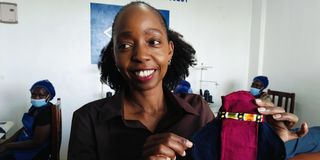Kajiado schoolgirls to benefit from washable sanitary pads project

Ms Jane Lucy Muthoni, founder of Double Blessing Sanitary Project, displays a reusable sanitary towel at the project's Kitengela Centre on 2 March 2024.
From next month, at least 2,000 schoolgirls in Kajiado County will benefit from a washable sanitary pad project which seeks to reduce girls' absenteeism during their menstrual cycles.
For decades, sexual and reproductive health issues have been considered 'taboo' in Maasai land, resulting in most Maasai girls entering adolescence without proper knowledge of their reproductive health, including menstrual hygiene.
The topic is rarely discussed in public forums, especially in the presence of 'elders', making it a women's affair.
According to the Centre for the Study of Adolescence in Kenya, by 2023, Kajiado County was struggling with a high teenage pregnancy rate of 20 per cent against the national average of 18 percent. The trend is attributed to lack of knowledge about reproductive health among teenagers.

A group of women making reusable sanitary towels at the Double Blessing Sanitary Project in Kitengela town on 2 March 2, 2024.
Two out of five girls reported missing school during menstruation. A large percentage went without sanitary towels, opting to improvise sanitary pads from locally available unhygienic materials. The high poverty index has been a major setback to girls' education in the county.
However, in full realisation of the conspicuous challenges that cut across both peri-urban and rural areas in Kajiado, a group of well-wishers in Kitengela town, have set up a washable sanitary pad sewing centre targeting to alleviate the pain of school-going girls from poor families.
The Double Blessing Project is targeting 2,000 needy girls in Kajiado South sub-County within the next 30 days before the project is rolled out across the county. At least 20,000 girls and adult women will be targeted throughout the county by December 2024.
Ms Lucy Muthoni, the founder of the project, told the Nation on Saturday that the project aims to ensure that no girl from poor families misses school due to lack of sanitary pads.
"After conducting our survey, we found out that most girls in Kajiado, especially in rural areas, do not have access to sanitary pads, leading to high absenteeism from school. Single-use sanitary pads are not sustainable. We want to make sure reusable pads are always available to our girls free of charge," said Ms Muthoni.
The organisation is targeting primary and secondary school girls first, before reaching out to various women's groups in both rural and urban areas.
"The material used to make the washable pads is of high quality to prevent any medical side effects. Each pad can be reused for three years," she added.
The schoolgirls will also benefit from reproductive health education sessions and menstrual cycle cards to enable them to monitor their cycles so as not to be caught unawares.
The project has become a source of livelihood for at least 15 local women, who earn Sh65 for each complete pad. The women have undergone rigorous training on how to make the pads.
For them, the project is a blessing as they can earn a living and use the reusable pads, especially now that Kenyans are struggling with the high cost of living.
"At least I can afford to take care of my family with the income from this project. I have adolescent girls whom I have introduced to reusable pads. It's very economical," said Jane Rose Ayako, a casual labourer.
In Kajiado County, 20.5 percent of teenage pregnancies were recorded in 2022, a decrease from 24 per cent recorded in 2021. Kajiado West, Central and South sub-counties lead with the highest number of reported teenage pregnancies in the county.





